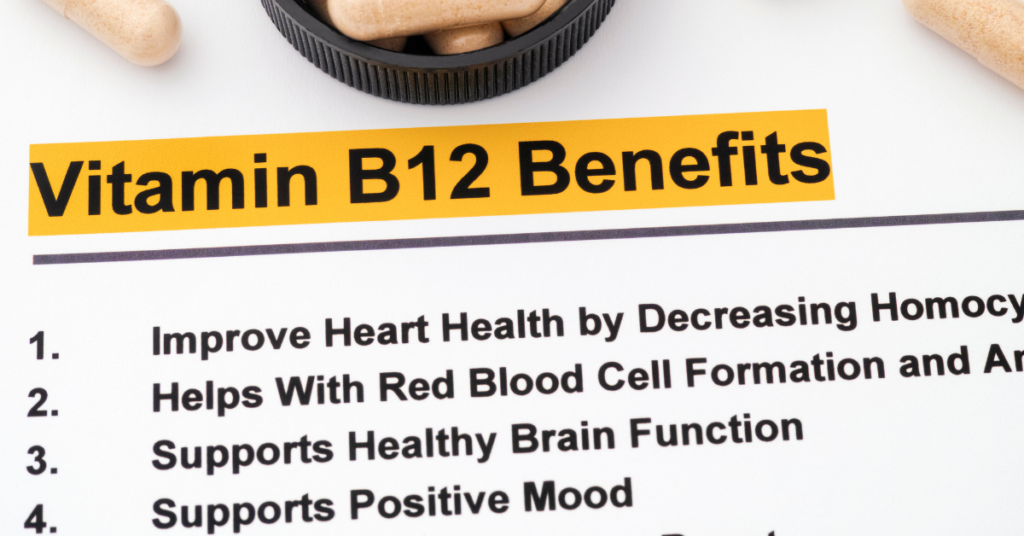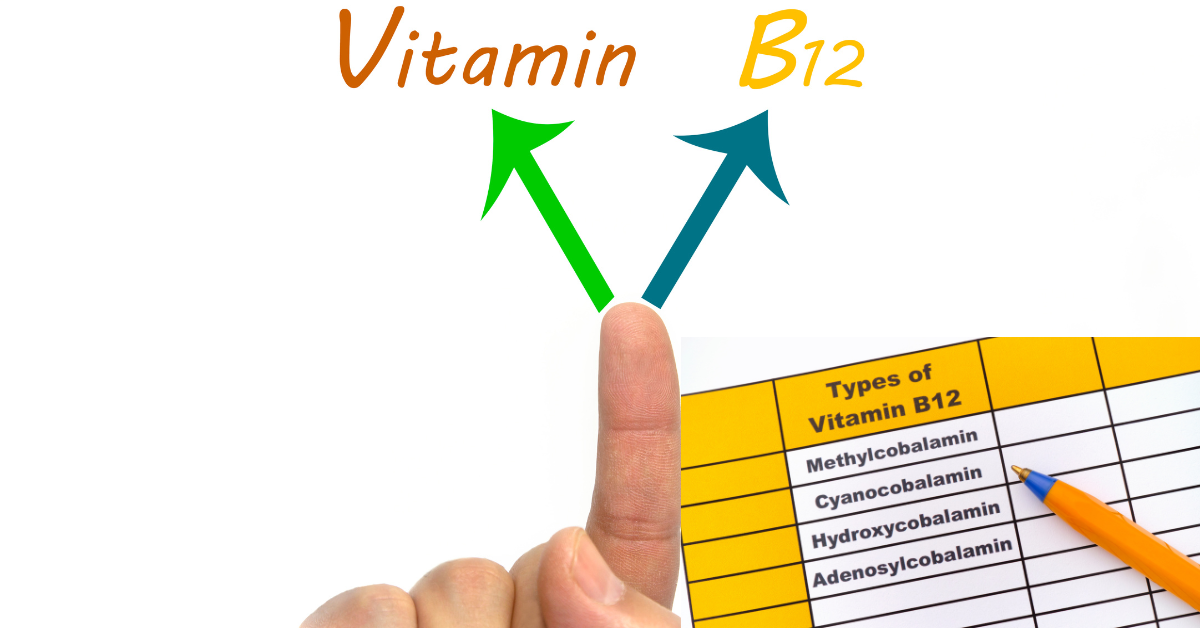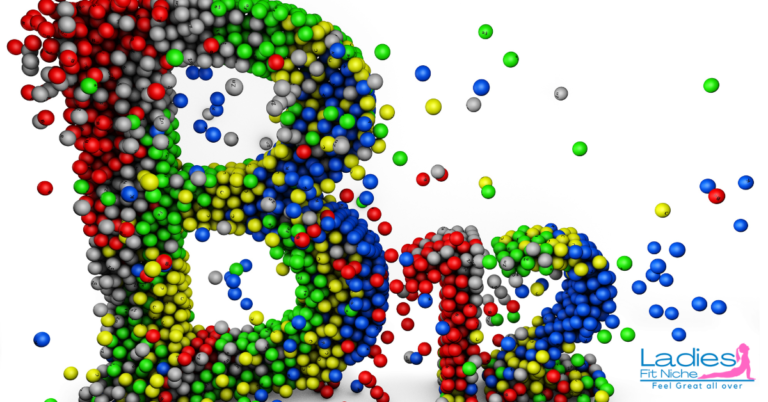Uncover Key Roles Of Vitamin B12 during the Menopausal Phase
Uncover the Key Role of Vitamin B12 during the menopausal phase. Learn how Vitamin B12 plays a crucial role in supporting women’s health and well-being during this transformative stage. Explore its benefits and understand why adequate levels of Vitamin B12 are essential for managing menopause symptoms and promoting overall vitality.
This essential nutrient is crucial for women in menopause, as it plays a vital role in red blood cell formation, cognitive function, nerve and DNA synthesis. Unfortunately, vitamin B12 deficiency is becoming more common, especially among older generations, and is linked to symptoms commonly experienced in menopause such as cognitive dysfunction, memory loss, and low bone mineral density.
It’s important to ensure that you are getting enough of this essential nutrient to support your body’s needs during this time of change. In this article, we will explore the basics of vitamin B12, the symptoms and risks of deficiency, and practical tips for supplementation to support your health and well-being in menopause.
Key Takeaways

- Vitamin B12 is essential for red blood cell formation, cognitive function, nerve and DNA synthesis.
- Vitamin B12 deficiency is becoming more common, especially among older generations, and is linked to symptoms common in menopause.
- Women should undergo proper diagnostic testing if a deficiency is suspected and consider taking vitamin B12 supplements if they suffer from malabsorption or do not consume the recommended dietary allowances (RDAs) of the essential vitamin.
- Women should also consider taking supplements for other vitamins and minerals for menopause, including vitamins E and D, and the minerals calcium and magnesium to prevent potential osteoporosis.
Key Role of Vitamin B12 in Menopause

Vitamin B12 plays several important roles in women’s health during menopause. Here are some key Roles and benefits:
- Energy production: Vitamin B12 is essential for the metabolism of carbohydrates, proteins, and fats, which are the primary sources of energy for the body. During menopause, when hormonal changes can contribute to fatigue and decreased energy levels, maintaining adequate B12 levels can help support energy production and combat fatigue.
- Nervous system health: Vitamin B12 is crucial for the health and proper functioning of the nervous system. It plays a role in the formation and maintenance of the protective covering of nerve cells, known as the myelin sheath. Adequate B12 levels are important for preserving nerve function, which can be particularly relevant during menopause when some women may experience neurological symptoms like tingling, numbness, or cognitive changes.
- Mood regulation: Vitamin B12 is involved in the synthesis of neurotransmitters, including serotonin and dopamine, which play a role in mood regulation. Menopause is a time of hormonal fluctuations that can contribute to mood swings, irritability, and even depressive symptoms. Ensuring sufficient B12 intake can support optimal neurotransmitter production, potentially helping to stabilize mood and reduce mood-related symptoms.
- Bone health: Vitamin B12 works in conjunction with other nutrients, such as calcium and vitamin D, to support bone health. Menopause is associated with a decline in estrogen levels, which can lead to a decrease in bone density and an increased risk of osteoporosis. Adequate B12 levels can contribute to the overall nutritional support needed for maintaining healthy bones during this stage of life.
- Cardiovascular health: Vitamin B12 plays a role in maintaining healthy homocysteine levels, an amino acid linked to an increased risk of cardiovascular disease. During menopause, the risk of cardiovascular issues can rise due to changes in hormone levels. Adequate B12 intake, along with other heart-healthy lifestyle choices, can help support cardiovascular health.
However, unlike some other vitamins, your body can’t create vitamin B12 on its own, so you need to consume it through foods or supplements.
It’s important to note that vitamin B12 deficiency is becoming increasingly common, especially among older generations. This is because absorption and metabolism of vitamin B12 can be hindered by age, decreased gastric acidity, and certain medications.
Good sources of vitamin B12 include meat, eggs, poultry, and dairy products. Vegans and vegetarians can find fortified breakfast cereals and nutritional yeast to meet their vitamin B12 needs.
To ensure optimal health and well-being during menopause, it’s crucial to consume enough vitamin B12 and consider supplements if needed.
B12 Supplementation and Menopause
Consider incorporating vitamin B12 supplements into your personalized menopause symptoms treatment plan, using them in conjunction with phytoestrogenic or hormone-regulating supplements.
Vitamin B12 is necessary for optimal endocrine system health and hormonal balance, making it an essential nutrient for menopausal women. It helps to regulate mood, energy levels, and cognitive function, which can all be affected during menopause.
When considering vitamin B12 supplementation, it’s important to be aware of the benefits and risks, as well as the proper dosage and timing. Benefits of vitamin B12 supplementation include increased energy, improved cognitive function, and reduced risk of osteoporosis.
Risks include interactions with certain medications and the possibility of overdose. It’s important to speak with your healthcare provider to determine the appropriate dosage and timing for your individual needs.
Incorporating vitamin B12 supplements into your menopause treatment plan can help to alleviate symptoms and improve overall health and well-being.
Click Here to check out the Best Vitamin B12 Supplements for Energy
Frequently Asked Questions

Can vitamin B12 deficiency cause hot flashes?
Yes, vitamin B12 deficiency can cause hot flashes. Low levels of vitamin B12 can lead to hormonal imbalances and affect the endocrine system. Taking vitamin B12 supplements can provide hot flash relief and other benefits for optimal health.
Is there a link between vitamin B12 deficiency and mood swings during menopause?
If you experience mood swings during menopause, it could be related to vitamin B12 and hormonal changes. Managing vitamin B12 deficiency in menopause is important for optimal health and well-being. Consider supplements and dietary changes.
What are some non-animal sources of vitamin B12 for vegans and vegetarians?
As a vegan or vegetarian, you can get your daily requirements of vitamin B12 from plant-based sources like fortified breakfast cereals, nutritional yeast, and plant milks. It’s important to be vigilant and consider taking supplements to prevent deficiencies.
How long does it take for vitamin B12 supplements to improve deficiency symptoms?
You may feel relief from vitamin B12 deficiency symptoms within a few days to a week of supplementing. Understanding vitamin B12 absorption and the benefits of vitamin B12 for overall health is important for preventing deficiencies.
Are there any risks or side effects associated with taking vitamin B12 supplements during menopause?
Managing vitamin B12 intake is crucial during menopause, but overdosing can lead to negative effects like acne, diarrhea, and nerve damage. Consult with your doctor and follow recommended dosages to avoid risk

Now that you understand the importance of vitamin B12 in menopause, it’s time to take action. Don’t wait until you start experiencing symptoms of deficiency.
Be proactive and get tested to see if you’re getting enough of this essential nutrient. Just like a car needs fuel to run smoothly, your body needs vitamin B12 to function optimally.







